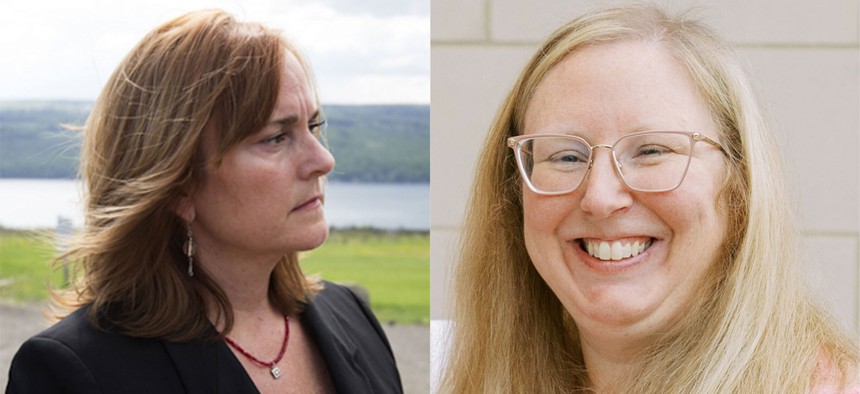Opinion
Opinion: How corporate influence in local elections drowns out concerns over harmful impacts of landfills
Here’s why advocacy groups like Seneca Lake Guardian in upstate New York and Citizens for Responsible Development-LST in Pennsylvania are taking a stand.

Yvonne Taylor, cofounder of the Seneca Lake Guardian, and Victoria Opthof-Cordaro, co-founder of Citizens for Responsible Development-LST . (Yvonne Tyalor image courtesy of Seneca Lake Guardian and Opthof-Cordaro image courtesy of Citizens for Responsible Development-LST)
Many people have the luxury of not thinking about where their trash goes after they throw it away. That’s it – it’s simply ‘away.’ For most people, to throw away is to forget.
We aren’t so lucky. Our towns live in the shadow of some of the largest landfills in the nation – Seneca Meadows in Seneca Falls, New York, and Bethlehem Landfill in Lower Saucon Township, Pennsylvania. Both are owned and operated by Waste Connections, a multi-billion dollar waste management corporation based in Texas, thousands of miles away from our homes and the ever-growing mountains of waste.
Other people’s trash permanently alters towns like ours. The odor is unmissable; our air and water quality is severely compromised; we risk exposure to toxic chemicals that can cause lung cancer and respiratory illness; and the town is overshadowed by a massive, foul pile of garbage.
But our towns’ politics have also been permanently altered by the landfills. Waste Connections has overreached in our local elections, flooded our towns with cash to influence officials, and divided our communities.
Recent election years in Seneca Falls and Lower Saucon Township have coincided with Waste Connections facing planned landfill closure dates. Eager to extend operations and expand their footprint, Waste Connections acted quickly and spared no expense to ensure pro-landfill candidates were filling the local governing bodies.
In 2021, in Seneca Falls, Waste Connections paid $200,000 to influence the town board of elections to unseat incumbent town board members in favor of pro-landfill candidates. That political spending dwarfed the $15,000 in combined campaign spending from the incumbents – long-standing members of the town board who had voted against granting Seneca Meadows an operating permit to extend its operations past its planned closure in 2025. Months later, newcomers Frank Sinicropi and Kaitlyn Laskoski voted to grant the landfill its local permit.
The same year, Waste Connections made over $100,000 in campaign contributions to its SuperPAC in Lower Saucon Township’s council race. This landfill cash supported the election of incumbents Jason Banonis and Thomas Carocci and newcomer Jennifer Zavacky (who later resigned after less than six months on council). Banonis, Carocci and an appointee hand-picked to replace Zavacky later voted to approve highly controversial zoning changes to allow the Bethlehem Landfill to grow its footprint by over 275 acres by destroying conservation forest.
Two towns in two different states, but the playbook remains the same. Create a SuperPAC (inaptly named “Responsible Solutions for New York” and “Responsible Solutions for Pennsylvania”), retain a political consulting firm, craft a narrative that the town’s economic health will perish without the landfill operating business as usual, pour outsized contributions into supporting hand-picked candidates’ campaigns, and elect new local officials who will vote in favor of the landfill despite persistent public opposition.
They’re up to their old tricks in Seneca Falls this year – ahead of the town board election on November 7, Waste Connections had already spent more than $13,000 backing the two pro-landfill town board candidates.
All of the messaging Waste Connections used to promote its candidates of choice – from the PAC websites to mailers to residents – centers on economy and taxes. Waste Connections’ messaging and fear mongering has effectively created the idea that without landfill operations continuing business as usual, our local economies will suffer. That couldn’t be further from the truth. In Seneca Falls, the landfill has deterred our usual visitors and tourists coming to experience the beautiful town and nearby wine country, and sales tax revenue is down. In Lower Saucon, views of the landfill will desecrate the 9/11 National Memorial Trail and despoil the Delaware and Lehigh National Heritage Corridor, a major tourist destination. Sustainable waste management – programs that reuse, repair, recycle, and compost materials – can create up to nine times more jobs than landfills.
Sound familiar? This blueprint has certainly been followed elsewhere, in other small towns across the country where Waste Connections owns a landfill that faces a planned closure date. The company owns and operates 56 solid waste landfills, 14 non-material solid waste landfills, and 11 gas and oil exploration and production waste landfills across 41 states – Seneca Falls and Lower Saucon Township are certainly not the only victims of Waste Connections’ schemes.
Corporate influence in our local elections has drowned out concerns about the harmful impacts of the landfills in our towns. Our elected officials are no longer representing the people they are meant to serve and protect – they’re settling for buyouts at the expense of the health and beauty of our environment and the health of our communities.
We won’t be steamrolled by Waste Connections – we believe in a future that is safe, sustainable, and trash free in New York, Pennsylvania, and around the nation. Millions of dollars won’t change our mind.
Yvonne Taylor is the co-founder of Seneca Lake Guardian. She lives in Hector, New York. Victoria Opthof-Cordaro is the co-founder of Citizens for Responsible Development-LST. She lives in Lower Saucon Township, Pennsylvania.
NEXT STORY: Commentary: Here’s how to create new pathways for unretirement success
